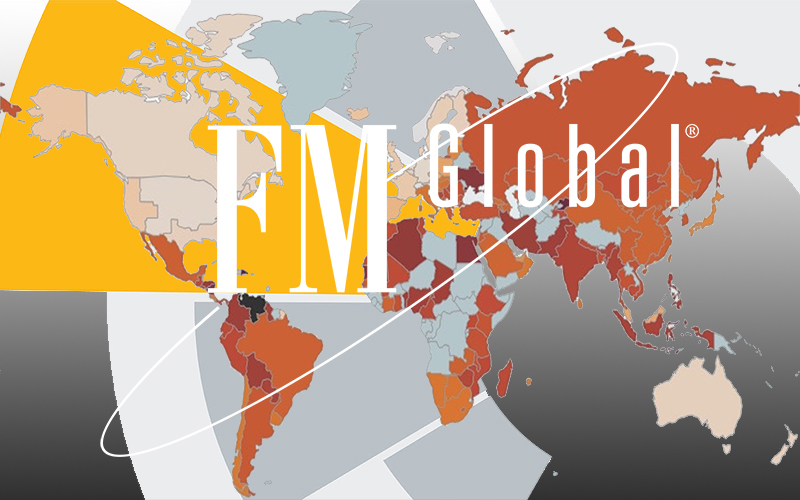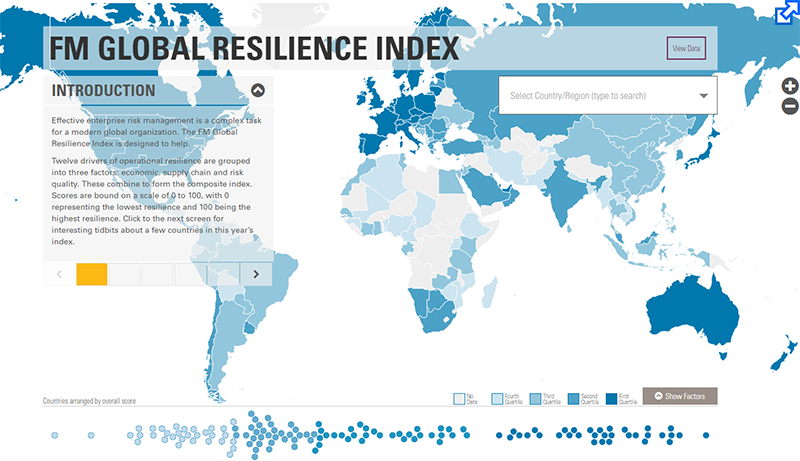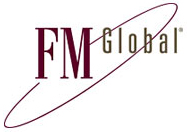How Does Your Supply Chain Resilience Rank?

The 2017 FM Global Resilience Index is the first data-driven tool and repository that ranks the resilience of 130 countries and territories according to their enterprise resilience to disruptive events.
The Year 2016 Was Wrought With Challenges Across The Globe
Hurricanes, earthquakes, terror and political upheaval all took a toll.
In addition, three emerging drivers of resilience have come to the forefront in recent years that are now included in the 2017 FM Global Resilience Index: the rate of urbanization, inherent cyber risk and supply chain visibility.
Resilience against events that could disrupt operations is a top priority for business executives seeking to minimize risk and maximize performance across their operations.
The ability of businesses to overcome disruptions throughout the world can make all the difference.
The FM Global Resilience Index is an annual ranking of 130 countries and territories according to their enterprise resilience to disruptive events.
Rankings are calculated as an equally weighted composite of 12 core drivers that affect the enterprise resilience of countries significantly and directly.
The historical data in this year’s index has been updated and calculated on this new basis for each of the last five years to enable valid historic comparison.
Here are the key results.
2017 Key Resluts
Switzerland occupies the top position in the 2017 FM Global Resilience Index. This reflects the fact that Switzerland is among the best in the world for its infrastructure and local suppliers, its political stability, control of corruption and economic productivity.
Luxembourg has risen gradually from eighth in 2013 to second in 2017, owing partly to its reduced reliance on oil for economic productivity. This reflects the continued growth in the importance of its services sector. Luxembourg enjoys a strong reputation for its financial sector, its network of service providers and its responsive, business-friendly regulations.
The country is well-placed to benefit from financial institutions that may be seeking a new home, post-Brexit, following the United Kingdom’s departure from the European Union.
The lowest-ranking country in the index is Haiti, which is among the poorest countries in the world. Ranked second to last, Venezuela is hampered by exposure to wind and earthquake, perception of extensive corruption, poor infrastructure and ill-perceived local supplier quality.
Inherent cyber risk can have a tremendous influence on enterprise resilience and is a driver added to the 2017 index. It combines equally a country’s vulnerability to cyber attack with the country’s ability to recover from such an attack.
In general, countries ranking high in internet penetration and low in civil liberties rank lowest for cyber risk. Middle Eastern countries have a particularly high exposure to cyber risk. In fact, the four countries ranking lowest in the index for inherent cyber risk are Saudi Arabia (ranked 56), Bahrain (ranked 44), United Arab Emirates (ranked 32) and Qatar (ranked 13).
The 2011 floods in Thailand brought the flooding problem prominently to global attention, but the disruption it causes to business operations is a continuing occurrence.
The six Asian countries in the FM Global Resilience Index that have the largest area devoted to economic activities exposed to riverine flood are Pakistan (ranked 125), Laos (ranked 113), Bangladesh (ranked 111), Thailand (ranked 97), Vietnam (ranked 95) and China (ranked 68, 72, 66).
Urbanization rate is related often to the toll taken by natural hazards and is a driver of resilience newly added to this year’s index. Countries in the index with significant flood exposure and high urbanization rates include Bangladesh (ranked 111), Thailand (ranked 97), Vietnam (ranked 95), China (ranked 68, 72, 66) and India (ranked 60).
These major global manufacturing hubs are susceptible to flooding, so the potential for severe disruption across business operations and global supply chains is considerable.
Supply chain visibility, another new driver within the index, is the ability to track and trace consignments across a country’s supply chain. Vietnam (ranked 95), with its thriving manufacturing sector increasingly important to the global supply chain, dropped eight places in the index since last year, owing primarily to poorer supply chain visibility.
Now, with years of data based on the FM Global Resilience Index algorithm, a noticeable level of consistency can be seen in terms of country rankings around the world. Countries at the top or bottom of the index tend to retain their status.
However, new risks that affect a country may emerge and FM Global will monitor these continually to provide the most accurate assessments of enterprise resilience for its clients and organizations around the world.

Conclusion
Sources of enterprise risk abound, but with pertinent information and thoughtful planning, many of these risks can be identified and their adverse impacts mitigated.
The 2017 FM Global Resilience Index combines the core drivers of enterprise resilience to disruptive events across countries in a single index.
Enterprise resilience is about minimizing vulnerability to disaster and boosting the ability to recover from it. Strengthening resilience to disruptive events brings economic and social benefits to citizens, corporations, industries and governments around the world.
FM Global hopes that the 2017 FM Global Resilience Index may even go so far as to help address the United Nation’s concern that, “there is little evidence that the risk information produced is really informing development or disaster risk reduction.”
For those willing to embrace its numerous implications, the index serves as a public resource to highlight strengths and vulnerabilities in enterprise resilience across the world and facilitate informed decision-making in strategic risk management.
Article Topics
FM Global News & Resources
2017 Resilience Index Annual Report How Does Your Supply Chain Resilience Rank? Understanding Supply Chain Resilience The 2015 FM Global Resilience Index Annual Report Countries That Have the Most Resilient Supply ChainsLatest in Supply Chain
Walmart Unleashes Autonomous Lift Trucks at Four High-Tech DCs Ranking the Best Countries for Private Business in EMEA Frictionless Videocast: The Importance of Water at the U.S./Mexico Border with Commissioner Maria-Elena Giner, International Boundary and Water Commission Why are Diesel Prices Climbing Back Over $4 a Gallon? Plastic Pollution is a Problem Many Companies are Still Ignoring Luxury Car Brands in Limbo After Chinese Company Violates Labor Laws 80% of Companies Still Unsure How to Best Leverage AI, Study Finds More Supply Chain
















